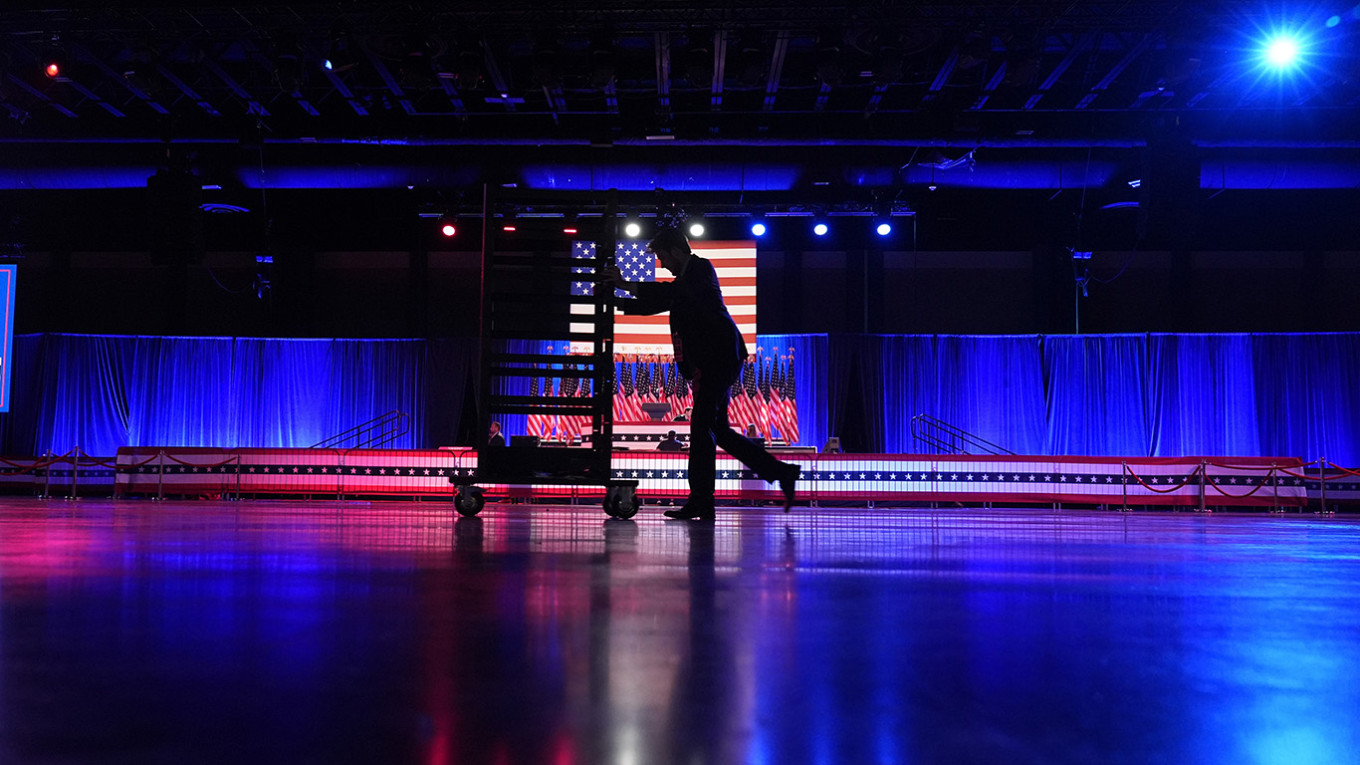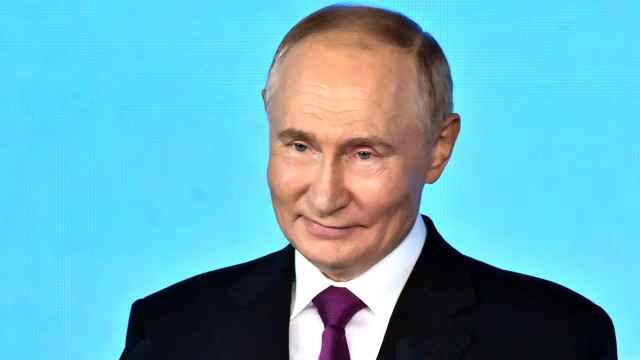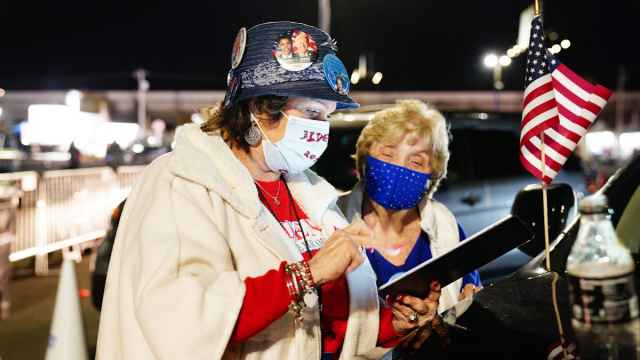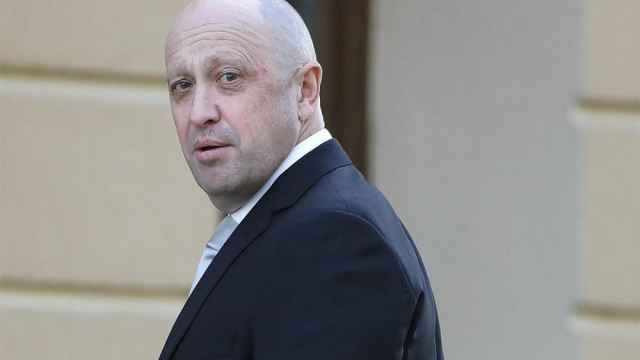Russia, Iran, China and others have all been accused of interfering in the 2024 U.S. presidential election, which saw Donald Trump win a historic second term in the White House after votes were counted Wednesday.
U.S. officials have long singled out Moscow, accusing it of trying to influence elections in Trump’s favor in 2016 and 2020.
Despite Russian officials’ repeated denials, widespread accounts and allegations of Russian influence operations have been documented throughout the 2024 election — though observers cautioned against overstating the real impact of these efforts.
The Moscow Times has collected some of the most prominent U.S. accusations of Russian disinformation and interference from the 2024 election cycle:
Bomb threats in Georgia
Polling stations in the state of Georgia received several “non-credible” bomb threats from Russia, Georgia Secretary of State Brad Raffensperger told reporters Tuesday.
According to Raffensperger, a Republican, the false threats disrupted voting at 12 polling places in Fulton, Gwinnett and DeKalb counties — three counties that surround the state capital Atlanta and have large Black communities.
Spreading doubt
Last week, the Office of the Director of National Intelligence (ODNI), the FBI and the Cybersecurity and Infrastructure Security Agency (CISA) claimed Russia was ramping up interference operations ahead of Tuesday’s election. According to security officials, Russia sought to “undermine public confidence in the integrity of U.S. elections and stoke divisions among Americans.”
The agencies accused Russia of producing videos and creating fake articles to call the legitimacy of the vote into question, instill fear in voters regarding the electoral process and suggest Americans were using violence against each other due to political preferences.
They also accused Moscow of amplifying false information that U.S. officials were planning to orchestrate election fraud across swing states using tactics such as ballot stuffing and cyberattacks.
Fake voter fraud clip
U.S. intelligence officials said Friday that they believed Russia was behind a fake viral video of a man purporting to be a Haitian immigrant with multiple IDs saying that he and a friend had voted multiple times for Democratic candidate and Vice President Kamala Harris in Georgia.
Georgia Secretary of State Raffensperger said the “obviously fake” video was created to spread doubt about the integrity of the state’s voting process.
Ballot burning in Pennsylvania
In late October, the ODNI, FBI and CISA released a joint statement debunking a viral video that purportedly showed ballots with votes for Trump burning in Pennsylvania, writing that the video had been manufactured and amplified by Russian actors.
“This Russian activity is part of Moscow’s broader effort to raise unfounded questions about the integrity of the U.S. election and stoke divisions among Americans, as detailed in prior ODNI election updates,” the statement said.
Tenet Media
The U.S. Justice Department unsealed an indictment on Sept. 4 charging two Russian nationals with connections to the Kremlin-funded RT news network of helping launder millions of dollars to right-wing media company Tenet Media.
Prosecutors alleged that Tenet Media’s founders, Lauren Chen and her husband Liam Donovan, knew RT was funding the company but made a significant effort to conceal it. The two RT employees then instructed Chen and Donovan to find a media personality to act as the “face” of the company. The two approached six right-wing influencers, including Tim Pool, Benny Johnson and Dave Rubin, according to the Columbia Journalism Review.
Influencers who agreed to work with Tenet received up to $400,000 per month to create original content for the company.
‘Doppelganger’
In September, the Justice Department announced it had seized 32 web domains in an effort to disrupt a Russian influence operation called “Doppelganger.”
Deputy Attorney General Lisa Monaco said that the Russian companies SDA, Structura and ANO Dialog used cybersquatting — a form of digital mimicry that tricks web users — fabricated influencers and created fake profiles “to promote AI-generated false narratives on social media.” “Those narratives targeted specific American demographics and regions in a calculated effort to subvert our election,” Monaco added.
The cybersquatting scheme used domain names similar to U.S. news sources, such as The Washington Post and Fox News, to funnel users toward content filled with pro-Russian narratives or divisive content, Politico reported.
Court documents highlighted Kremlin domestic policy chief Sergei Kiriyenko as playing a key role in the “Doppelganger” operation.
AI content
An anonymous official from the ODNI told reporters in late September that Russia was generating more AI content aimed at the U.S. presidential election than any other country.
The official told Reuters that AI content produced by Moscow was “consistent with Russia's broader efforts to boost the former president's [Trump] candidacy and denigrate the vice president [Harris] and the Democratic Party, including through conspiratorial narratives.”
Storm-1516 and Storm-1679
In late August, Storm-1516, a Russian actor known for distributing propaganda, began producing content implicating Vice President Harris and her running mate Governor Tim Walz in outlandish fake conspiracy theories, according to a Microsoft Threat Analysis Center report.
The group produced inauthentic videos designed to discredit Harris and stoke controversy around her campaign. One shows an attack by alleged Harris supporters on what they claim was a Trump rally attendee. Another used a paid actor to make false claims that Harris paralyzed a girl in a 2011 hit-and-run accident.
NBC News reported that Storm-1516 has been responsible for creating at least 50 false narratives in the past year. The group is said to rely primarily on faked primary sources — audio, video, photos and documents — presented as evidence.
Hany Farid, a professor of digital forensics at the University of California Berkeley, told NBC News that he had identified evidence of AI manipulation in a number of Storm-1516 videos. “Could they make better videos? Sure,” Farid said. But “these videos basically work. You don't have to make Hollywood-style fake videos to get people to start doubting everything.”
Vice President-Elect JD Vance appeared to have unwittingly shared content created by Storm-1516 when he repeated false claims that Ukrainian leaders had spent U.S. aid money on yachts.
Another group, Storm-1679, posted two videos advancing conspiracy theories and false claims about Harris’s policies, one of which received more than 100,000 views on X.
Rybar
In October, the FBI offered a reward of $10 million for information on the identity or location of anyone who “knowingly engaged or is engaging in interference in U.S. elections.” The announcement singled out the pro-war Russian Telegram channel Rybar, which has ties to the late Wagner Group founder Yevgeny Prigozhin.
According to the FBI, Rybar manages a number of social media channels that promote Russian political interests in the U.S.
In an interview with The Washington Post, Rybar founder Mikhail Zvinchuk denied allegations that his media projects were trying to interfere in the U.S. presidential race and said his work is dedicated to “defending” Russia’s “information borders.” At the same time, Zvinchuk said Rybar has a “worldwide” network with over 250 channels in 28 languages.
A Message from The Moscow Times:
Dear readers,
We are facing unprecedented challenges. Russia's Prosecutor General's Office has designated The Moscow Times as an "undesirable" organization, criminalizing our work and putting our staff at risk of prosecution. This follows our earlier unjust labeling as a "foreign agent."
These actions are direct attempts to silence independent journalism in Russia. The authorities claim our work "discredits the decisions of the Russian leadership." We see things differently: we strive to provide accurate, unbiased reporting on Russia.
We, the journalists of The Moscow Times, refuse to be silenced. But to continue our work, we need your help.
Your support, no matter how small, makes a world of difference. If you can, please support us monthly starting from just $2. It's quick to set up, and every contribution makes a significant impact.
By supporting The Moscow Times, you're defending open, independent journalism in the face of repression. Thank you for standing with us.
Remind me later.







